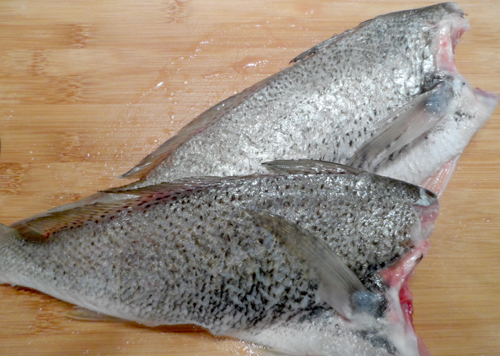by Ray Linville
Drive to the beach along U.S. Highway 74 and tune in a local radio station. If you do, you might hear an ad for Lumbee Fish Market in Pembroke that is so intriguing that you want to visit. It’s a market with fish that you might not expect in a location about two hours inland from coastal waters.

Native Americans have lived in this region for centuries because streams and artesian wells provided an adequate water supply and fish were abundant in the wetland landscape of swamps, creeks, and pocosins. But do the local Native Americans, known as Lumbee, want only freshwater fish?

Managed by Emma Locklear for about six years, the market caters to a high demand for saltwater fish. When the market opened, Locklear’s two uncles operated it until the health of one began to fail and the other didn’t have adequate time for the business (because his preaching commitments were too demanding). When they announced plans to close the market, Locklear stepped in – and has run it ever since.

Although the “fresh catch” board when I visited listed a variety of coastal fish, croaker was the most popular choice of the day. When croaker is not available, Locklear’s customers quickly select another choice. “We carry whatever is running on the coast,” she said.

“When we don’t have croaker, everybody buys spot,” she said. “Everybody loves spot.” Locklear also said that roe mullet is very popular because “a lot of people like the eggs that come with that fish.”

After the market receives a delivery, it acts as a hub to supply local family-owned restaurants – Linda’s, Cozy Corner, Papa Bill’s — with the latest catch. However, its primary business is to individual customers. Local restaurants account for only 20 percent of the market’s trade. The surrounding Lumbee community (who reside in not only Robeson but also the neighboring counties of Scotland, Cumberland, and Hoke) want the best fish from coastal Carolina, and frequent deliveries are brought from the Wilmington area. At the market, the fresh fish are packed in ice much like they are when taken off the boats.

The Lumbee Fish Market is located near the center of the Robeson County, through which flows the Lumber River that gives the Lumbee their name. The market benefits by being in Pembroke because the town is the tribe’s economic, cultural and political center. The market is also near a growing university once known as Pembroke State College for Indians, which enrolled only Native Americans until 1953, but is now a regional campus of the University of North Carolina System.

Long before the Spanish, French, and English traded European-made tobacco pipes and other items to Native American peoples, a thriving trade of fish likely sustained the Natives as well as the explorers well before colonial settlements expanded to this area. This trade continues today through the entrepreneurial spirits of Emma Locklear and her market.

________________________________________________
Frying Croaker in the Pan
After the fish market has cleaned and prepared the croaker for you, follow these easy steps:
1. Mix a cup of all-purpose flour with a teaspoon each of salt and black pepper. Place the croaker into the bowl, and coat with flour mixture.
2. Pour vegetable oil into a pan to cover the bottom. Place pan on medium heat and add fish pieces to pan without crowding them.
3. Cook the first side for three minutes or until brown.
4. Turn the fish carefully and cook the remaining side for three additional minutes or until brown.
5. Remove fish from pan and place on paper towel to soak up any excess oil.
6. Sprinkle fish with lemon juice and serve.
________________________________________________
Ray Linville is an associate professor of English and humanities at Sandhills Community College in Pinehurst, NC, and serves on the board of the N. C. Folklore Society. Read more about Ray’s ramblings at his blog: Sights, Sounds and Tastes of the American South.
________________________________________________
Resources
Fish Finder (Guide to What’s Catching)
N.C. Department of Environment and Natural Resources
Leave a Reply